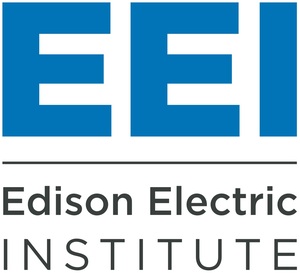NEW YORK, Feb. 8, 2017 /PRNewswire-USNewswire/ -- Edison Electric Institute (EEI) President Tom Kuhn and three other EEI officers – David Owens, Phil Moeller, and Richard McMahon – today briefed Wall Street analysts, bankers, and investors on the state of the U.S. electric power industry. Kuhn and the panelists discussed a range of issues, including the importance of working with the Trump Administration and new Congress, as well as many new governors, legislators, and regulators in the states to develop a shared policy agenda.
"EEI will work with President Trump and with key policymakers on both sides of the political aisle to develop an agenda that supports investments in infrastructure, grows the economy, and recognizes the vital role of the energy grid and the importance of maintaining reliable, affordable, secure, and increasingly clean energy for all customers," said Kuhn.
The EEI team outlined other top industry policy priorities, which include supporting comprehensive tax reform, workforce development, smart city and electric vehicle initiatives, streamlining and expediting the process for permitting and siting energy infrastructure, and updating state regulatory approaches for planning, pricing, and allocating the costs of the distribution system and flexibility in pricing customer services, including grid services.
"Today, EEI's member companies are making significant investments to make the energy grid smarter, more dynamic, more flexible, and more secure to integrate and deliver a mix of both central station and distributed energy resources to customers," said Kuhn. "They are investing in cleaner generation sources that make business sense. And, they are partnering with leading technology companies to create innovative energy solutions that give customers more control over their energy use."
EEI's member companies are investing more than $100 billion each year, spending a projected $120.8 billion in 2016 alone. This is more than twice the level of investment of just a decade ago. The industry contributes more than 2 percent to America's real GDP, and directly and indirectly provides well-paying jobs for more than one million men and women in communities large and small across the country.
There is already widespread recognition that investments in the energy grid are enabling greater reliability and resiliency against natural threats, such as Hurricane Matthew, as well as manmade threats, such as cyberattacks.
"Protecting the energy grid is our top priority, and every day we are working to improve grid security, reliability, and resiliency," said Kuhn. "Our security strategies constantly evolve and are closely coordinated with the federal government through a partnership called the Electricity Subsector Coordinating Council (ESCC). By working together through the ESCC, industry and government greatly enhance our nation's ability to defend and protect against cyber and physical security threats."
During the presentation, the EEI team emphasized the industry's commitment to a clean and affordable energy future. Today, one-third of U.S. power generation comes from zero-emission sources – nuclear energy and renewables, such as hydropower, wind and solar. As of 2015, industry carbon dioxide emissions were nearly 21 percent below 2005 levels. With declining prices for natural gas, renewable energy, and new technologies, this trajectory will continue.
"More than ever, we must remain focused and excited about the changes our industry is facing and our future," concluded Kuhn. "It is up to us to deliver the energy future our customers want and expect—it is a great privilege, and one that comes with awesome responsibility. To deliver on this future and our customer-driven vision, we are focused on smarter energy infrastructure, cleaner energy, and innovative energy solutions. By continuing to lead together on the issues driving the electric power industry's transformation, EEI and our member companies will demonstrate Power by Association, and we will deliver America's energy future."
View the full briefing here.
EEI is the association that represents all U.S. investor-owned electric companies. Our members provide electricity for 220 million Americans, operate in all 50 states and the District of Columbia, and directly and indirectly employ more than one million workers. EEI has dozens of international electric companies as International Members, and hundreds of industry suppliers and related organizations as Associate Members.
SOURCE Edison Electric Institute
Related Links
WANT YOUR COMPANY'S NEWS FEATURED ON PRNEWSWIRE.COM?
Newsrooms &
Influencers
Digital Media
Outlets
Journalists
Opted In





Share this article